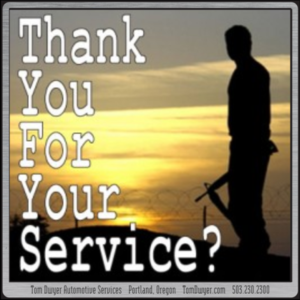 Thank You For Your Service? Thanks is more than a word, it means keeping promises.
Thank You For Your Service? Thanks is more than a word, it means keeping promises.
It’s Veterans’ Day again and time to thank all our Veterans for their service. This, as every year, it’s important to remember that the holiday is about much more than cookouts and mattress sales. It’s an opportunity to contemplate the sacrifices of American soldiers for 236 years, and to thank today’s veterans on behalf of all of them. Although today’s political debate is characterized by an almost pathological level of disagreement, we like to believe one of the defining characteristics of people of good will on either side of the divide is they respect our soldiers, regardless of the particular war they fought in. So as we were thinking about respect, we started thinking about what we, as a society, have promised our vets. What do we owe them, and how are we doing on that promise?
Probably the best place to check on how we’re keeping our promises is with the vets themselves. Blue Star Families is a group formed by military spouses to raise awareness of the challenges of military life and to support military families in the challenges of military life. They questioned 3,634 military family members for their 2012 Military Family Lifestyle Survey and found the top 5 issues of concern were
- Pay and benefits
- Spouse employment
- Effects of deployment on children
- OPTEMPO (the speed and pace of military life)
- TBI, PTS, and Combat stress (TBI is Traumatic Brain Injury; PTS is Post Traumatic Stress)
Vivian Greentree, who directed the annual survey for Blue Star Families, mentioned other significant findings. “The number of food stamps used at military commissaries has tripled in the last four years.” Education had a big effect on children, “because on average, military kids change schools more than half a dozen times.”
This was also the first survey to ask about suicide, finding that one in ten service members (and one in ten family members) reported considering suicide. “Twenty-three percent of the comments cited the need to eradicate the stigma that still surrounds mental health seeking or counseling,” says Greentree.
The survey found nearly three out of four service members say the end of the restrictions on gays in the military had no impact on their ability to do their job, and three out of four also social media has become an important way to communicate during deployments.
Finally, and sadly, 95 percent of military families surveyed said the public doesn’t understand or appreciate the sacrifices of service members and their families.
Why don’t our military families feel appreciated? Are they right to feel that way? We’ll look briefly at three areas where our society has made promises to our vets, and see how we’re keeping them.
Military Pay
By the end of June 2011, inflation-adjusted median household income for the whole country fell to $49,909 and the poverty level for 2011 was $22,350 (total yearly income) for a family of four.
After four months in the military a new recruit gets about $29,959 per year in annual salary, including the value of free housing, free food, and income-tax advantages. This is a little higher than the $25,000 that civilian high-school grads can expect, but it drops off rapidly after that. An enlisted person with 10 years military experience and technical training makes about $54,952 compared to $70,373 in the civilian world. Officers do a little better… if the person was a first-year commissioned officer they’d make an average starting salary of $45,969, and after 10 years of experience would be taking home an average of $94,313.
Is this an appropriate way to compensate people who dedicate their lives to the military? One good indicator of how adequate it is for our troops is this… A 2008 report showed that military members and their families redeemed food stamps at nearly twice the civilian rate, and in 2011 Stars and Stripes reported food stamp purchases at military commissaries nearly tripled. Nearly $88 million worth of food stamps were used at commissaries nationwide, up from $31 million in 2008.
Veteran’s Health Care
The quality of veteran’s health care varies depending on who you ask. As late as 2006, veterans themselves rated Veteran’s Administration (VA) health care higher than other Americans rate private-sector health care for the sixth consecutive year. Yet the VA is also plagued by scandals, is notoriously hard to navigate, and (just like private sector insurance) can generate anguish over what procedures or illnesses are covered. Even Fox News sees problems with the VA, and an appellate court found that VA care for mental health was so bad it was unconstitutional.
Funding explains much of the VA’s problems. When we figure the cost of a war, the cost of caring for our returned soldiers is not included. When it comes to the costs of the Iraq and Afghanistan wars, that cost will be huge.
A study from Harvard University titled “Soldiers Returning from Iraq and Afghanistan: The long-term costs of providing veterans medical care and disability benefits,” says the hidden financial costs of war in Iraq and Afghanistan will overwhelm the Department of Veterans Affairs for decades. The study says the Veterans Administration is both under-funded and under-equipped to deal with the current and future costs of veterans’ health care. It estimates that since the Global War on Terror began, 16 US soldiers have been wounded per fatality, a casualty rate that exceeds the rate of previous wars. Over 200,000 soldiers deployed to Iraq and Afghanistan have been treated at VA medical facilities thus far, with 900,000 still deployed on active duty. The study predicts that the cost of medical care and compensation benefits will exceed seven hundred billion dollars.
Veteran’s Employment
The job outlook for vets is a mixed picture. The unemployment rate for all Gulf War II Era vets (anyone who served after September, 2001) was 8.3%, about the same rate as the civilian population. (Other studies put it as high as 12.1% or even 17%) However, drilling down, the rate is vastly different for individual subgroups. Service connected disability didn’t affect the rate much (8.5% with disability vs. 7.9% for non-disabled), but male veterans aged 18 to 24 had an unemployment rate of 29.1% in 2011, significantly higher than that of young male nonveterans at 17.6%.
Perhaps the most surprising thing about these numbers is that unemployment among veterans isn’t higher. They face special hurdles in the job market that civilians don’t encounter.
Many civilian employers don’t understand the resumes or skills of a vet, so they don’t see how they could fit into the business. A new tool from Monster.com can help with this a little; it allows a vet to input their MOS (Military job title) and the program returns a list of civilian world job skills.
Soldiers who stay active in the National Guard can be called up without warning and for indefinite periods, but employers must keep their jobs (or an equivalent) open until they return. This is a risk that many employers are unwilling to take.
Finally, some employers are worried about the stability or safety of vets, especially the Gulf War II vets who face massive problems from PSTD and TBI.
If we are going to do better integrating these people into the civilian world we have to do better, and fast. About 7,000 veterans have found jobs through 140 “Hiring Our Heroes” job fairs, but this will be small help facing what one VA official calls a “tsunami” of more than a million veterans who will be returning from Iraq and Afghanistan.
Everyone, not just our military, deserves respect for the contributions they make to our society. We couldn’t function without teachers, doctors, and accountants, and coal miners and farmers die on the job every day. But the military is something different… the rest of us may work hard, and we may even accidentally die on the job, but only soldiers can be intentionally ordered to die as part of the job. Not every soldier risks death every day, but each one accepts that possibility when they put on the uniform. Our country owes something special to any person willing to put their life on the line like that. First, those of us who stay behind have an obligation to build a society worth defending. If we are going to ask someone to give their lives for our country, it shouldn’t be some cruel, ironic joke. Second, we must keep the promises we made to our veterans, both as a government and as people. If we can’t keep our promises to them when they come back, then it’s the worst sort of criminality to accept the gift of their lives before they go.










